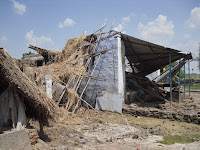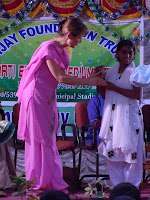Most of the children here have their sights set on gaining good qualifications & a successful career path. There have been a few boys, who haven’t wanted to continue their studies & they have been supported by the charity in joining a local training centre, where they can learn a trade.
However, the majority of children here in the home, & especially the girls, understand the need for good qualifications if they are to strive for independence in the future. From what I’ve experienced & learned here they have an uphill struggle ahead to bring social reform to a country so set in its traditions & beliefs.
Sandhya believes that good teachers for the children are the key to this. As she says, if we can give them a good education & good values, everything else will fall into place. So that’s the next hurdle that they face here in Aarti Home & School, as, of course, they can’t afford to pay as much as other schools & how can they therefore attract good staff? So, they will now seek sponsorship for teachers too. People will be able to sponsor a teacher for eg. one month or more, which will help to pay the salaries & in turn lead to well educated children, who, from what I’ve seen, will go out into the world & try to bring about the changes that are so desperately needed.
There are children here, who were abandoned at birth simply because they are girls. There are others, whose mothers committed suicide, as they could no longer face the domestic violence of their husbands or the emotional abuse of their so-called families. These children have every reason to want to build a better India!
During the four weeks I’ve spent living among the adults & children here, I’ve been carefully watching to see what is needed, as so many of you were kind enough to donate money before I left England. I’ve talked about the way of life here at Aarti Home for the children & I’ve stressed that they are well fed & cared for & happy. To us in the West, they seem to have very little but that’s only in comparison to our abundant materialism! I’ve discovered that there are toys & books here - a lot of second hand toys & games, which the children can have access to when they’re not meant to be studying & some are kept in the school for play sessions for the younger children. So, my offer to buy more toys & games etc. was declined, as they feel they already have so many. There is a very strong work ethic & the children are used to doing their daily chores & studying hard in the evenings, so they don’t have a lot of time to play, unless they don’t take the optional afternoon nap. Sunday is the only time that I notice the children at a loose end & then they seem happy to make up their own games. The latest craze seems to be what I remember from my childhood as “Jacks”, which they are all playing with pebbles.
So, as my month in India draws to a close, I’m taking with me a myriad of amazing memories & experiences & I know that I shan’t be leaving Aarti behind totally when I leave tonight. I know that the children will stay with me for the rest of my life & I’ll continue to support them as much as possible from home, after all, this is an ongoing situation.
 |
| Just some of the books |
 |
| New pc & printer |
However, I’m thrilled to say that together we’ve been able to make a difference here now: we have bought a computer, two printers & some pen drives, which will benefit the adults & children of both the orphanage & the school. We have also been able to buy a lot of books for the children plus they will have shoes (they all go barefoot currently) & we can also help with school uniforms for the new academic year in June. All these expenses have to be met somehow, so Sandhya & her co-workers are delighted & grateful, as am I! The children too are amazed that people in another country care about them. As one of the older girls said of you all, “They have a good heart!” I can only agree. They have asked me to tell you all in England that they say “Hi!” to you & are grateful for what you have done for them. So, on behalf of all the wonderful Aarti children, “Thank you all so much!”
 |
| The children waving to all their English friends! |











 Flood devastation
Flood devastation 


























